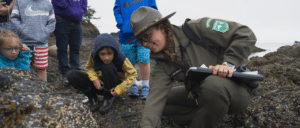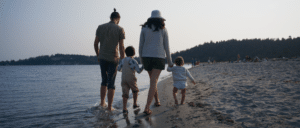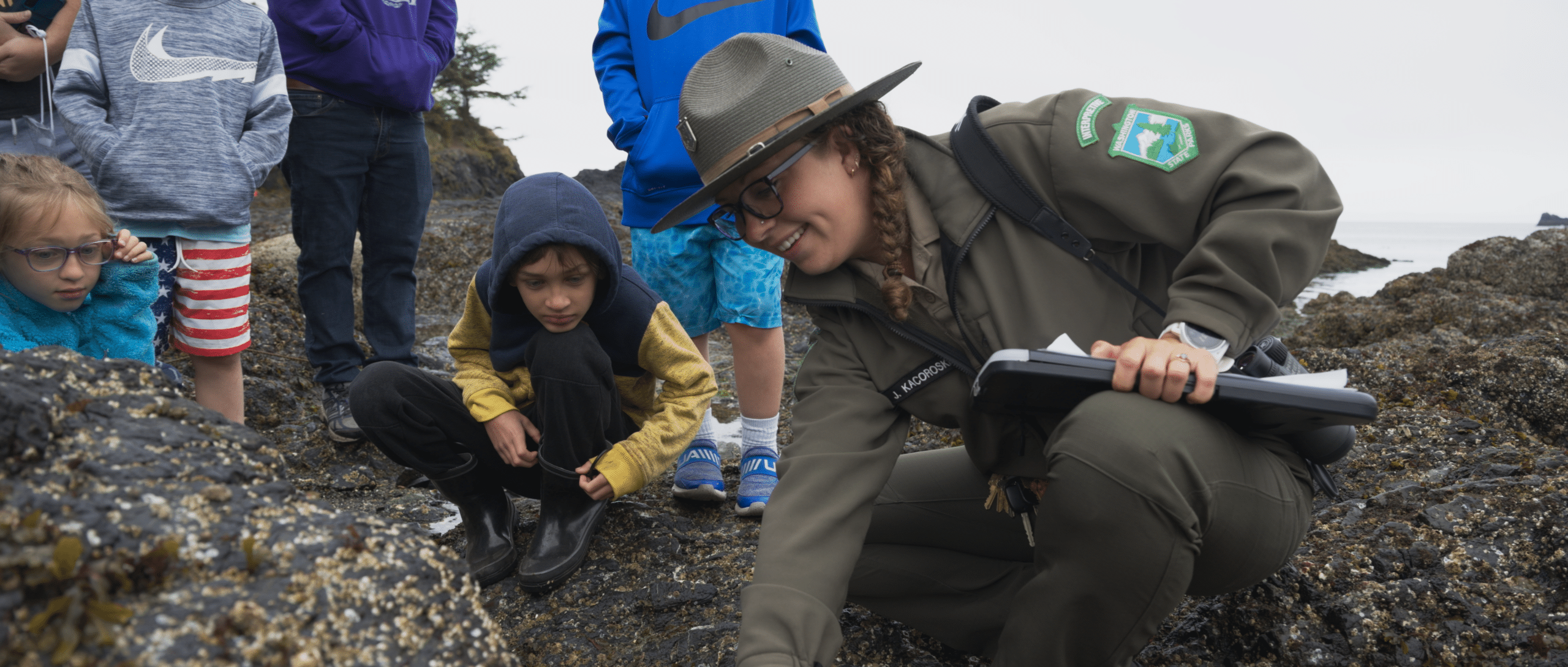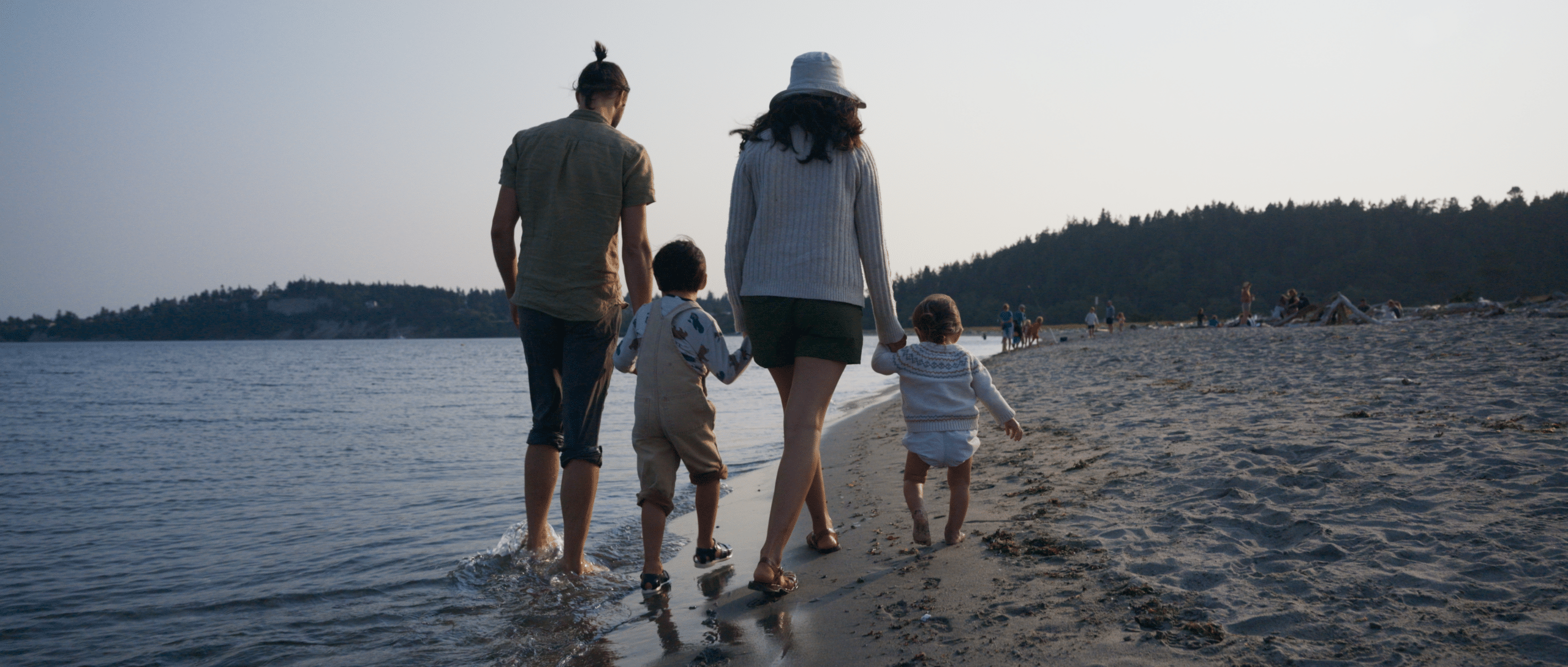Meet Joy Kacoroski—Interpretive Specialist for Washington State Parks—and learn how interpretation helps residents and visitors connect with and understand our maritime resources.
Can you tell me your name and title?
My name is Joy Kacoroski, and I work as a Parks Interpretive Specialist at Deception Pass State Park.
Washington State Parks are stewards of a lot of the land that is encompassed within the Maritime Washington National Heritage Area. As stewards of the land, it’s our responsibility to help connect visitors to the natural resources, the cultural resources, and the historical resources of the area. So as an interpreter, my job is to help teach people and to create those connections for them for.
Walk us through a typical day as an Interpreter.
On a given day, perhaps a busy Saturday, I’ll start my day with a bird walk [for park visitors]: looking at birds within our freshwater lakes and hopefully some birds out in our saltwater ecosystems. Then I might transition over to a walk along our sand dunes trail, helping to explain the importance of sand dune habitats, how they create a really unique place for different animals to live. Then I get all of our equipment together for one of our concert series here in the park.
If you had to choose one word to describe Washington State Park’s saltwater parks, what would it be?
The word that comes to mind for me is diverse. Our parks along the coast offer a diversity of resources that Washingtonians and visitors can explore. They also offer a diverse set of opportunities in terms of how we might choose to explore the parks, whether it’s fishing, boating, paddle boarding, hiking, camping, or just spending time out on the beach.
There’s a lot of different natural and cultural resources that people can experience. Our old growth forests; glacially-carved out balds where we have beautiful meadows and wildflowers; our rocky shoreline, where you can explore our tidepools or just hang out within our saltwater bays; and our freshwater lakes.
In terms of our cultural resources, there’s a lot of really interesting cultural connections and historical connections, especially throughout the Maritime Washington National Heritage Area. Some of those cultural connections include our local Indigenous tribes, early European settlers, and the boating history that we have out here as well.
Can you tell us more about the tidepool ecosystems?
At Deception Pass State Park, we have some of the most accessible rocky intertidal zones that folks can explore. We see quite a few people who come out here year after year to explore these tide pools. As you walk down to the pools, you’ll be able to experience some of the different zones within the intertidal and some of the different animals that call those places home: barnacles, small little aggregating anemones, tidepool sculpins, sea star, sea cucumbers—all sorts of really neat animals that are able to survive the constant movement of the waves and constant change of the tides.



How do you feel most connected to Washington’s maritime heritage?
I would define heritage as our connections to our community and our sense of place, so for me personally, it’s down at the beach. I just love when I have that extra moment before I have to head home, and I go sit down at the beach—watch the sunset, listen to the waves go in and out, the ripple of the rocks back and forth. I just think about the people who were here before me and the experiences that they had, the experience I’m currently having, and the experiences that people will have after me.
As we learn more about the National Heritage Area, what have you been surprised by?
I’ve been surprised by all the partners that are a part of the National Heritage Area. It’s amazing to see all of the organizations, agencies, individuals, Indigenous tribes of Washington State all coming together to protect this area and steward the resources.
What are some ways the public can get involved with Washington State Parks?
There’s a lot of wonderful volunteer opportunities within our Washington State Parks, especially our coastal parks, in terms of different beach cleanups that we have throughout the state system.
If you’re interested in working for State Parks, definitely get out and meet some of our State Parks staff. We’re quite a community, and we’d love to meet you and talk to you about your career goals or where you might see them going in the future.
What is a cherished memory that you have from your time as an interpretive specialist?
I had a young child, who was probably about seven years old at the time, come up to me and say, “Ranger Joy, I’ve met you before. You swore me in as a Junior Ranger!” She was really excited to see me again. Her mom showed me a photo from pre-COVID when I had sworn her in for her first Junior Ranger badge at four years old.
For me, working as an interpreter and getting to see our families year after year and getting a chance to watch some of these children grow in a state park that I spent a lot of my childhood at has always been very special.
If you liked this interview, check out our other “This Is Maritime Washington” videos.
To learn more about Washington State Parks and to volunteer, please visit their website where you can find information about parks near you, volunteering, and beach cleanup opportunities.




